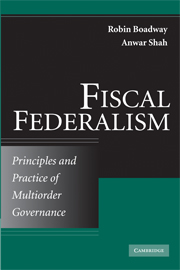Book contents
- Frontmatter
- Contents
- Preface
- PART ONE DESIGNING FISCAL CONSTITUTIONS
- 1 Introduction to Federalism and the Role of Governments in Federal Economies
- 2 The Decentralization of Government Authority
- 3 Expenditure Assignment
- 4 Revenue Assignment
- 5 Natural Resources Ownership and Management in a Federal System
- 6 Local Governance in Theory
- 7 Local Governance in Practice
- PART TWO REVENUE SHARING AND FISCAL TRANSFERS
- PART THREE FINANCE AND PROVISION OF PUBLIC SERVICES
- PART FOUR CHALLENGES AND RESPONSES
- References
- Index
6 - Local Governance in Theory
Published online by Cambridge University Press: 05 June 2012
- Frontmatter
- Contents
- Preface
- PART ONE DESIGNING FISCAL CONSTITUTIONS
- 1 Introduction to Federalism and the Role of Governments in Federal Economies
- 2 The Decentralization of Government Authority
- 3 Expenditure Assignment
- 4 Revenue Assignment
- 5 Natural Resources Ownership and Management in a Federal System
- 6 Local Governance in Theory
- 7 Local Governance in Practice
- PART TWO REVENUE SHARING AND FISCAL TRANSFERS
- PART THREE FINANCE AND PROVISION OF PUBLIC SERVICES
- PART FOUR CHALLENGES AND RESPONSES
- References
- Index
Summary
We will strive increasingly to quicken the public sense of civic duty, that thus … we will transmit this city not only not less, but greater, better, and more beautiful than it was transmitted to us.
– Oath of office required of council members in the ancient city of AthensLOCAL GOVERNMENT AND LOCAL GOVERNANCE
Local government refers to specific institutions or entities created by national constitutions (Brazil, Denmark, France, India, Italy, Japan, Sweden), by state constitutions (Australia, the United States), by ordinary legislation of a higher level of central government (New Zealand, the United Kingdom, most countries), by provincial or state legislation (Canada, Pakistan), or by executive order (China) to deliver a range of specified services to a relatively small geographically delineated area. Local governance is a broader concept and is defined as the formulation and execution of collective action at the local level. Thus, it encompasses the direct and indirect roles of formal institutions of local government and government hierarchies, as well as the roles of informal norms, networks, community organizations, and neighborhood associations in pursuing collective action by defining the framework for citizen-citizen and citizen-state interactions, collective decision making, and delivery of local public services.
Local governance, therefore, includes the diverse objectives of vibrant, living, working, and environmentally preserved self-governing communities. Good local governance is not just about providing a range of local services but also about preserving the life and liberty of residents, creating space for democratic participation and civic dialogue, supporting market-led and environmentally sustainable local development, and facilitating outcomes that enrich the quality of life of residents.
- Type
- Chapter
- Information
- Fiscal FederalismPrinciples and Practice of Multiorder Governance, pp. 242 - 265Publisher: Cambridge University PressPrint publication year: 2009



